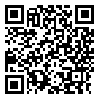Volume 26, Issue 12 (2-2020)
RJMS 2020, 26(12): 122-127 |
Back to browse issues page
Download citation:
BibTeX | RIS | EndNote | Medlars | ProCite | Reference Manager | RefWorks
Send citation to:



BibTeX | RIS | EndNote | Medlars | ProCite | Reference Manager | RefWorks
Send citation to:
Mohammadi Kooshki A, Norouzi E, Mohammadi Kooshki A, Moradian N, Alipour F. The crisis of congenital cataract diagnosis: Assessment of unilateral congenital cataract diagnosis age in children treated in Tehran Farabi Eye Hospital from 2010 to 2017. RJMS 2020; 26 (12) :122-127
URL: http://rjms.iums.ac.ir/article-1-5971-en.html
URL: http://rjms.iums.ac.ir/article-1-5971-en.html
Abdolreza Mohammadi Kooshki1 

 , Elahe Norouzi2
, Elahe Norouzi2 

 , Ashkan Mohammadi Kooshki3
, Ashkan Mohammadi Kooshki3 

 , Negar Moradian4
, Negar Moradian4 

 , Fateme Alipour *5
, Fateme Alipour *5 




 , Elahe Norouzi2
, Elahe Norouzi2 

 , Ashkan Mohammadi Kooshki3
, Ashkan Mohammadi Kooshki3 

 , Negar Moradian4
, Negar Moradian4 

 , Fateme Alipour *5
, Fateme Alipour *5 


1- Tehran University of Medical Sciences, Tehran, Iran, Central Jannat Abad, Tehran.
2- Iran University of Medical Sciences, Rasoul Akram Hospital, Tehran
3- Iran University of Medical Sciences
4- Tehran University of Medical Sciences
5- , Tehran University of Medical Sciences, Tehran, Iran, Farabi Hospital, Tehran ,alipour@tums.ac.ir
2- Iran University of Medical Sciences, Rasoul Akram Hospital, Tehran
3- Iran University of Medical Sciences
4- Tehran University of Medical Sciences
5- , Tehran University of Medical Sciences, Tehran, Iran, Farabi Hospital, Tehran ,
Abstract: (4372 Views)
Background: Congenital cataract is one of the most important causes of blindness and severe visual impairment in children. Early diagnosis and treatment of congenital cataract is essential. Considering the great importance of blindness in children and the massive expense that burden to the health care system, we planned a study to assess the age of unilateral congenital cataract diagnosis in the children referred to contact lens clinic at Farabi Eye Hospital in Tehran.
Methods: This descriptive study was performed in the spring and summer of 2019. All the aphakic children due to unilateral congenital cataract referred to contact lens clinic at Farabi eye hospital from 2010 to 2017 were invited for participation in the study. For those persent, the family face to face interview and visual acuity examination were performed.
Results: Of 82 children who called for interviews, 38 patients (46.3%) accepted to participate in this study and were ready for the interview. The mean age at diagnosing was 4.94 months (Median: 4, Range 0-24). Only 3 cases (7.9%) were diagnosed at birth. 4 patients’ congenital cataract (11.4%) were diagnosed during routine follow up after hospital discharge. From the remaining 32 children, 13 families referred to pediatricians, and just 3 cases (23.07%) were diagnosed. Nineteen families referred to ophthalmologists, and congenital cataract was diagnosed in 16 (84.2%) of them. All 13 cases whom congenital cataract was not diagnosed by neither pediatricians nor ophtalmologists referred to the ophthalmologists in 2nd visit, and 12 cases were diagnosed.
Conclusion: Red reflex examination in all newborns is highly recommended, and suspected cases should be promptly referred to an ophthalmologist. It seems that the training during the residency course for pediatricians about congenital cataract screening is not sufficient or effective. It is of great importance emphasis on of early diagnosis and treatment of congenital cataract to achieve an excellent visual outcome.
Methods: This descriptive study was performed in the spring and summer of 2019. All the aphakic children due to unilateral congenital cataract referred to contact lens clinic at Farabi eye hospital from 2010 to 2017 were invited for participation in the study. For those persent, the family face to face interview and visual acuity examination were performed.
Results: Of 82 children who called for interviews, 38 patients (46.3%) accepted to participate in this study and were ready for the interview. The mean age at diagnosing was 4.94 months (Median: 4, Range 0-24). Only 3 cases (7.9%) were diagnosed at birth. 4 patients’ congenital cataract (11.4%) were diagnosed during routine follow up after hospital discharge. From the remaining 32 children, 13 families referred to pediatricians, and just 3 cases (23.07%) were diagnosed. Nineteen families referred to ophthalmologists, and congenital cataract was diagnosed in 16 (84.2%) of them. All 13 cases whom congenital cataract was not diagnosed by neither pediatricians nor ophtalmologists referred to the ophthalmologists in 2nd visit, and 12 cases were diagnosed.
Conclusion: Red reflex examination in all newborns is highly recommended, and suspected cases should be promptly referred to an ophthalmologist. It seems that the training during the residency course for pediatricians about congenital cataract screening is not sufficient or effective. It is of great importance emphasis on of early diagnosis and treatment of congenital cataract to achieve an excellent visual outcome.
Type of Study: Research |
Subject:
Pediatric Disease
Send email to the article author



